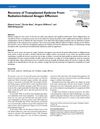10 citations,
June 2021 in “EMBO reports” When skin blisters, healing the wound is more important than growing hair, and certain stem cells mainly fix the blisters without helping hair growth.
3 citations,
October 2021 in “Clinical, Cosmetic and Investigational Dermatology” Setipiprant did not significantly improve hair growth in men with hair loss.
 1 citations,
August 2023 in “Clinical, Cosmetic and Investigational Dermatology”
1 citations,
August 2023 in “Clinical, Cosmetic and Investigational Dermatology” A condition with certain scalp changes may come before acne keloidalis nuchae and other similar hair loss disorders.
 1 citations,
January 2023 in “Aesthetic surgery journal”
1 citations,
January 2023 in “Aesthetic surgery journal” Facial plastic surgeries and aesthetic procedures are becoming more popular in India, with a preference for non-surgical options and effective treatments for facial enhancement and hair loss.
 1 citations,
March 2015 in “Journal of Cutaneous Medicine and Surgery”
1 citations,
March 2015 in “Journal of Cutaneous Medicine and Surgery” Eyebrow hair transplants can regrow after high-dose radiation therapy.
 October 2024 in “Skin Appendage Disorders”
October 2024 in “Skin Appendage Disorders” PRP is popular for hair restoration but needs better research methods to confirm its effectiveness and safety.
 March 2024 in “Dermatology and therapy (Internet)”
March 2024 in “Dermatology and therapy (Internet)” Genetic factors could lead to personalized treatments for hair loss.
 December 2023 in “Lasers in Medical Science”
December 2023 in “Lasers in Medical Science” Fractionated laser therapy, especially erbium-glass laser, effectively increases hair thickness in people with hair loss but doesn't increase the number of hairs.
 September 2023 in “bioRxiv (Cold Spring Harbor Laboratory)”
September 2023 in “bioRxiv (Cold Spring Harbor Laboratory)” Freezing gamma-irradiated amniotic fluid may help hair growth and speed up the growth phase.
 April 2011 in “Vestnik dermatologii i venerologii”
April 2011 in “Vestnik dermatologii i venerologii” Certain gene variations and irregular X chromosome activity may contribute to hair loss in women who can have children.
December 2021 in “Cureus” Minoxidil alone is the most cost-effective treatment for male hair loss at a $50,000 threshold.
 39 citations,
April 2016 in “Case Reports in Dermatology”
39 citations,
April 2016 in “Case Reports in Dermatology” Tofacitinib temporarily regrew hair in a man with alopecia, but its effects didn't last.
26 citations,
January 2018 in “Annals of dermatology/Annals of Dermatology” Hair graying may be caused by stem cell depletion from stress or melanocyte damage.
 17 citations,
October 2013 in “F1000Research”
17 citations,
October 2013 in “F1000Research” A 2-year-old boy grew excessive hair after using minoxidil for hair loss, but it improved when the treatment stopped.
 10 citations,
August 2019 in “The World Journal of Men's Health”
10 citations,
August 2019 in “The World Journal of Men's Health” Kimchi probiotics slightly improved hair density, but more research needed.
 7 citations,
February 2019 in “International Journal of Dermatology”
7 citations,
February 2019 in “International Journal of Dermatology” Gray hair is caused by reduced melanin production or transfer issues, linked to aging and possibly health conditions, with treatments focusing on color camouflage.
 6 citations,
April 2018 in “Obstetrics, gynaecology and reproductive medicine”
6 citations,
April 2018 in “Obstetrics, gynaecology and reproductive medicine” Most women with hirsutism have it because of PCOS, and they need long-term treatment including medication and hair removal to improve their condition.
 4 citations,
May 2022 in “Future Journal of Pharmaceutical Sciences”
4 citations,
May 2022 in “Future Journal of Pharmaceutical Sciences” Melatonin-loaded microemulsion could be a promising treatment for hair loss.
 2 citations,
May 2022 in “Cosmetics”
2 citations,
May 2022 in “Cosmetics” Further research is needed to understand how the microbiome affects hair loss in Alopecia Areata.
 2 citations,
October 2020 in “The Journal of clinical and aesthetic dermatology”
2 citations,
October 2020 in “The Journal of clinical and aesthetic dermatology” The herbal mix (Biochanin A, Acetyl tetrapeptide-3, and Ginseng Extracts) and the 3% Minoxidil solution are equally effective in treating hair loss, but the herbal mix has fewer side effects.
1 citations,
May 2017 in “InTech eBooks” New treatments focusing on immune pathways show promise for stubborn hair loss.
 November 2024 in “Fermentation”
November 2024 in “Fermentation” Fermented ginsenosides from kimchi bacteria may promote hair growth better than finasteride.
 August 2023 in “Journal of Cosmetic Dermatology”
August 2023 in “Journal of Cosmetic Dermatology” Using a laser with minoxidil was more effective for hair loss than minoxidil alone.
 June 2023 in “International journal of research in ayurveda and pharmacy”
June 2023 in “International journal of research in ayurveda and pharmacy” Dhatryadi Rasayana, an Ayurvedic herbal mix, may be a safe and effective way to prevent premature hair greying.
 January 2012 in “Elsevier eBooks”
January 2012 in “Elsevier eBooks” New treatments for skin and hair repair show promise, but further improvements are needed.
 January 2008 in “Elsevier eBooks”
January 2008 in “Elsevier eBooks” More men are getting cosmetic surgery, with nose jobs and hair transplants being popular, and choosing a qualified surgeon is important.
 21 citations,
March 2019 in “Journal of The American Academy of Dermatology”
21 citations,
March 2019 in “Journal of The American Academy of Dermatology” The review highlights the need for more research on transgender dermatology, the role of dermatologists in gender affirmation, and the effects of hormone therapy on skin and hair.
 April 2024 in “Lasers in medical science”
April 2024 in “Lasers in medical science” Lasers and light therapies are effective in promoting hair regrowth for different types of hair loss.
April 2024 in “Cosmetics” Wigs help improve self-esteem and quality of life for people with hair loss from alopecia areata.
 7 citations,
January 2018 in “International Journal of Trichology”
7 citations,
January 2018 in “International Journal of Trichology” Wearing a wig caused a skin condition to develop in a woman with hair loss.























